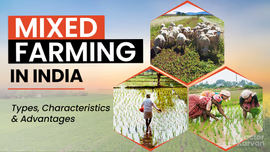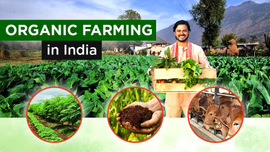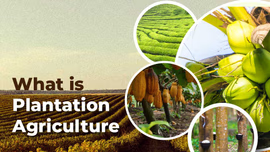A Deep Dive into Indian Agriculture: Production, Exports and Challenges

Agriculture is lifeline of Indian economy. With its rich diversity, unique landscapes, and varied climates, India stands tall as an agricultural powerhouse. Curious to explore how this transformation unfolded and what makes Indian agriculture so remarkable? Dive into this article to uncover the key facets that shape the nation's farming success.
Table of Contents
- Introduction
- What is the Status of Agriculture Production in India?
- All about the Indian Agricultural Export
- What are the Major Cropping Seasons in India?
- How Indian Economy is Transformed Through Agriculture?
- What are the Key Investments in the Indian Agriculture Sector?
- What are the Main Challenges in Indian Agriculture?
- What are the Government Policies to Support Agriculture in India?
- Youth Involvement in Indian Agricultural Sector
- Government Policies for Promoting Youth Involvement in Agriculture
Introduction
Indian agriculture employs almost half the nation's population directly or indirectly. In India, around 70% of the population earns its livelihood from agriculture. It is an important raw material source for many agro-based industries. Today, India is the largest producer of several commodities, including spices, pulses and milk. It is also among the leading producers of tea, fruits, vegetables, sugarcane, wheat, and rice. The introduction of the Green Revolution in 1965 transformed agriculture in India by contributing to increased farming areas, allowing double cropping, promoting HYV seed adoption, increasing the use of pesticides and inorganic fertilizers, enhancing irrigation facilities, and enhancing the measures for crop protection.
What is the Status of Agriculture Production in India?
The agricultural sector of India is expected to reach 24 billion dollars by 2025. The grocery and food market of India is already the sixth largest, and retail contributes around 70% of the sales. Some of the facts about agriculture in India are:
- The nation's total food grain production was 329.69 million tonnes in 2022-23.
- India is also the 2nd largest producer of food grains, fruits and vegetables and the 2nd largest exporter of sugar globally.
- The area under rabi crops increased by 3.25% in 2022-23, reaching 720.68 lakh hectares.
- The horticulture output hit 351.92 million tonnes in 2022-23, which is an increase of 1.37% in comparison to last year's production of 329.69 million tonnes.
- Around 52% of the gross sown area had irrigation access in 2022-23, which is around 73 million hectares.
- India has a wide-ranging and large raw material base suitable for food processing industries due to its diverse Agro-climatic conditions.
- Farm equipements are very useful as it improves productivity by up to 30% and reduces the input cost by about 20%. Tractors account for most of the farm mechanization in India. The country is also the largest market for tractors worldwide.
The major commercial crops and food grains production (in metric tonnes) in the year 2022-23 are given below:
|
Commercial Crops |
Production (in metric tonnes) |
|
Rice |
135.5 |
|
Wheat |
112.7 |
|
Cereals |
350 |
|
Pulses |
27.5 |
|
Food Grains |
330.5 |
|
Oilseeds |
40.9 |
|
Sugarcane |
494.2 |
|
Cotton |
34.3 |
|
Jute & Mesta |
9.4 |
All about the Indian Agricultural Export
During 2023-24, the agricultural exports from the country were recorded to be worth US$ 48.15 billion. The export of agricultural and processed food products was at US$ 53.12 billion dollars in 2022-23. The primary commodities exported for this period were:
|
Commodity |
Export (in billion US$) |
|
Marine products |
8.08 |
|
Rice (basmati and non-basmati) |
11.15 |
|
Wheat |
1.52 |
|
Spices |
3.79 |
|
Sugar |
5.77 |
|
Oil meals |
1.60 |
|
Castor oil |
1.27 |
|
Misc Processed Items |
1.42 |
The major export destinations for Indian agri commodities are Vietnam, Bangladesh, USA, China, Indonesia, Thailand, Iran, Malaysia, UAE and Saudi Arabia.
What are the Major Cropping Seasons in India?
|
Cropping Season |
Sowing Season |
Harvesting Season |
Crops |
States |
|
Rabi |
October-December |
March-April |
Wheat, barley, peas, mustard, gram. |
Haryana, Punjab, Himachal Pradesh, Jammu and Kashmir, Uttarakhand, Uttar Pradesh. |
|
Kharif |
June-July |
September-October |
Rice, jowar, maize, bajra, tur, moong, urad, cotton, jute, groundnut, soybean. |
West Bengal, Assam, coastal Odisha, Andhra Pradesh, Telangana, Tamil Nadu, Kerala, Maharashtra. |
|
Zaid |
March-April |
June |
Seasonal fruits, vegetables, fodder crops. |
Most of the Northern and North-western states. |
How Indian Economy is Transformed Through Agriculture?
- The agricultural sector in the country contributed around 18% to the GDP in 2022-23. Around 65% of the population is directly involved in agriculture and allied activities.
- Agriculture is the primary source of livelihood for more than half of India's total population. The food and processing industries, farm mechanization, agricultural services, etc., are running through agriculture, which brings employment opportunities to the country.
- Agriculture plays a vital role in providing the country's people with food, contributing to overall food security. Agricultural products such as coffee, sugar, tea, nuts, spices and others are exported and makeup 50% of the total exports. The total worth of agriculture exports in 2022-23 was US$ 52.50 billion. The commercial use of agricultural products helps the government earn revenue, thus contributing significantly to the Indian economy.
- Agriculture provides raw materials to various agro-based industries, including cotton textiles, jute, cotton, etc. Food processing industries also rely on agriculture. Thus, the growth of these industries is directly linked to agricultural development.
- Agriculture helps generate high revenue as a source of income for central and state governments through land revenue and moving agricultural goods using railways.
What are the Key Investments in the Indian Agriculture Sector?
The major points related to significant developments and investments in agriculture are:
- In the 2023 Union Budget, the Digital Agriculture Mission was allocated INR 450 crores to promote digital agriculture and fund projects using modern information technologies like robotics, IoT in agriculture, blockchain technology and artificial intelligence.
- A Memorandum of Understanding (MoU) was signed by NBCC, NABARD (National Bank for Agriculture and Rural Development), and NCDC (National Cooperative Development Cooperation) to construct the largest grain storage in the cooperative sector.
- Under the Aatmanirbhar Bharat Horticulture Clean Plant Program, a budget of INR 2,200 crores was dedicated to promoting high-value horticulture crops.
- The agriculture and allied sectors have been allocated around 1.9% of the total budget for the financial year 2024. Around 8.3% of the Union Budget will fund key subsidies, like petroleum, fertilizer and food subsidies. Around 1.3% is set aside for the PM KISAN Yojana to assist small and marginal farmers.
- India signed deals to export 5,00,000 tons of new season basmati rice in Europe and the Middle East in November 2023.
- India has performed tremendously in agritech funding. Between 2017 and 2022, India received 1 billion dollars in agritech funding. By 2025, Indian agritech companies are likely to witness investments worth US$ 30-35 billion.
What are the Main Challenges in Indian Agriculture?
Productivity related Challenges
- The average farm size in India has been declining, thus hampering overall productivity. The total agricultural land in India in 2021 was at around 60%. However, a majority of this is small farm sizes, which limits economies of scale.
- Many farmers in India depend on monsoons for irrigation necessities. It restricts them from increasing their crop intensity. Around 50% of the Gross Cropped Area is under irrigation coverage.
- Credit is another challenge faced by agriculture in India. Even though a significant budget is allocated to agriculture in the Union Budget for farmers to have access to credit, around 30% of the farmers still borrow money from non-institutional agencies.
Environmental Challenges
- The constant degradation of soil health is a threatening challenge that affects overall agricultural productivity. The excessive use of pesticides and fertilizers leads to the deterioration of the soil. Apart from this, drought, floods, forest fires, and nutrient deficiencies are responsible for the degradation of soil.
- Water unavailability is a significant issue leading to bad environmental changes. Farmers still lack water facilities, hampering their farm tasks and leading to lower crop yields. Moreover, with the increase in global temperature, the situation related to water availability for irrigation is worsening. Several areas are affected by the lack of proper water availability or drought. Water scarcity restricts the full potential of agriculture. However, the government is helping farmers improve water management to ease water availability in India.
What are the Government Policies to Support Agriculture in India?
- The National Mission for Sustainable Agriculture (NMSA) helps enhance agricultural productivity, especially in rainfed areas, focusing on integrated farming, water use efficiency, soil health management and synergizing resource conservation.
- Pradhan Mantri Krishi Sinchayee Yojana (PMKSY) has been formulated to extend the coverage of irrigation ('Har Khet ko Pani') and improve water use efficiency ('More crop per drop') in a focused manner with an end-to-end solution.
- Pradhan Mantri Kisan Samman Nidhi Yojana (PM-Kisan) is a central sector scheme with 100% funding from the Government of India. Under the scheme, an income support of INR 6,000 per year in three equal instalments is provided to all land-holding farmer families.
- Pradhan Mantri Annadata Aay SanraksHan Abhiyan (PM-AASHA) is aimed at ensuring farmers receive remunerative prices for their produce. Basically, it provides Minimum Support Prices (MSP) to the farmers.
- Pradhan Mantri Fasal Bima Yojana (PMFBY) aims to provide insurance coverage and financial support to the farmers in the event of failure of any of the notified crops because of natural calamities, pests & diseases.
- Paramparagat Krishi Vikas Yojana (PKVY) is an extension to Soil Health Management (SHM) in the National Mission on Sustainable Agriculture (NMSA) 's Centrally Sponsored Scheme (CSS).
Youth Involvement in Indian Agricultural Industry
In recent years, a major generational shift has emerged, with youth pivoting from traditional farming towards more technologically advanced agribusiness ventures. Across India, young people are driven to redefine agriculture by means of startups, precision farming and digital platforms. In the past decade, more than 1000 Agri-Tech startups have emerged, founded by entrepreneurs in their 20s and 30s. It is expected to propel the sector into a $24 billion market by 2025. Agri-clinic and Agri-business Centres, Rastriya Krishi Vikas Yojana (RKVY) and many other government schemes have been introduced to promote agri-preneurship among youth.
Government Policies for Promoting Youth Involvement in Agriculture
India has implemented a number of policies and initiatives to encourage young individuals to participate in agriculture and related areas. Several of these schemes include:
Attracting and Retaining Youth in Agriculture (ARYA) Scheme: Initiated by the Indian Council of Agricultural Research (ICAR) in 2015-16, ARYA focuses on empowering rural youth by providing training, exposure visits, and support for agribusiness development and entrepreneurship.
Startup Village Entrepreneurship Programme (SVEP): SVEP promotes entrepreneurship among rural youth, including those in agriculture, by providing financial assistance, skill training, and market linkages for setting up micro-enterprises.
National Rural Livelihoods Mission (DAY NRLM): NRLM focuses on poverty alleviation and rural livelihoods enhancement by promoting self-employment and entrepreneurship among rural youth, including in agriculture and allied activities.
These initiatives strive to empower youth, improve their skills and talents, and offer entrepreneurial opportunities in agriculture, thereby contributing to rural development and agricultural sustainability in India.
Frequently Asked Questions On A Deep Dive into Indian Agriculture: Production, Exports and Challenges
1. Should agriculture in rural India be mechanized?
Yes, agriculture in rural India should be mechanized, as it improves productivity by efficiently using resources.
2. What does agriculture mean to India?
Agriculture is the backbone of the Indian economy. It comprises activities like crop and livestock production, aquaculture, fisheries, and forestry for food and non-food products.
3. Why is agriculture important in India?
Agriculture is important in India as most of the population is directly employed in this industry, and the industry significantly contributes to the national GDP.
4. What type of agriculture is practised in India?
Subsistence agriculture is widely practised in India.
5. How has the green revolution changed agriculture in India?
The Green Revolution changed agriculture in India by allowing double cropping, promoting HYV seed adoption, increasing the use of pesticides and inorganic fertilizers, enhancing irrigation facilities, and enhancing the measures for crop protection.
6. How much agricultural land is there in India?
The agricultural land varies based on irrigation facilities, climate and soil type. 51.09% of the land is cultivated area in India, of which 21.81% is forest area and 3.92% is pasture area.
7. How many types of agriculture are there in India?
India has eight types of agriculture: subsistence agriculture, shifting agriculture, intensive farming, extensive farming, commercial agriculture, plantation agriculture, wetland farming, and dryland farming.
8. Which soil is suitable for agriculture in India?
Loamy soil is suitable for agriculture in India as it is a mix of sand, silt and clay soil and offers suitable space, air and water for ideal crop growth.


Related Blogs












